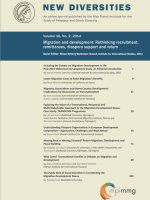Migration and Development: Rethinking recruitment, remittances and return
In September 2000, world leaders came together at the United Nations Headquarters in New York to adopt the United Nations Millennium Declaration, committing their nations to a new global partnership to reduce extreme poverty and setting a series of time-bound targets - with a deadline of 2015 - that have become known as the Millennium Development Goals (MDGs). The eight MDGs to be achieved by 2015 did not include goals and targets related to migration, basically – some might argue – because the hype around the migration-development nexus was not yet established in the international policy agenda-setting fora. Since 2003, when the Global Development Finance Annual Report took formal notice of remittances to developing countries, increasing attention to the migration- development link ensued: First in migrant-receiving states, and later in the international fora, such as the Global Forum on Migration and Development (GFMD). Since then, studies, policy analyses, international forums and recommendations on migration have aimed to work for policy development in practical ways, including efforts to include migration concerns in the post-2015 development agenda.
Articles in this special issue, edited by senior researcher Ninna Nyberg Sørensen, take issue with migration-development relevant questions such as recruitment, collective remittances and co-development, cross-fertilization of experiences between migrant organizations of various national and geographic origins, diaspora contributions to development and reconstruction in fragile situations, the developmental effects of return of irregular migrants and rejected asylum seekers, the family assumptions much migration-development policy-talk rest upon, and the broad question of whether and how academic knowledge should feed into political and policy-formulating for a. The full set of articles expands the basis on which to make migration issues an integral part of the Sustainable Development Goals agenda succeeding the Millennium Development Goals. A key message emerging across the issue is that any formulation of migration-development goals and effective implementing of policies in the area must consider the adverse effects of tighter migration control. If prevented from mobility, how would some of the world’s most disadvantages people be able to contribute to development where public policy and official aid programmes have failed?
DIIS Experts


